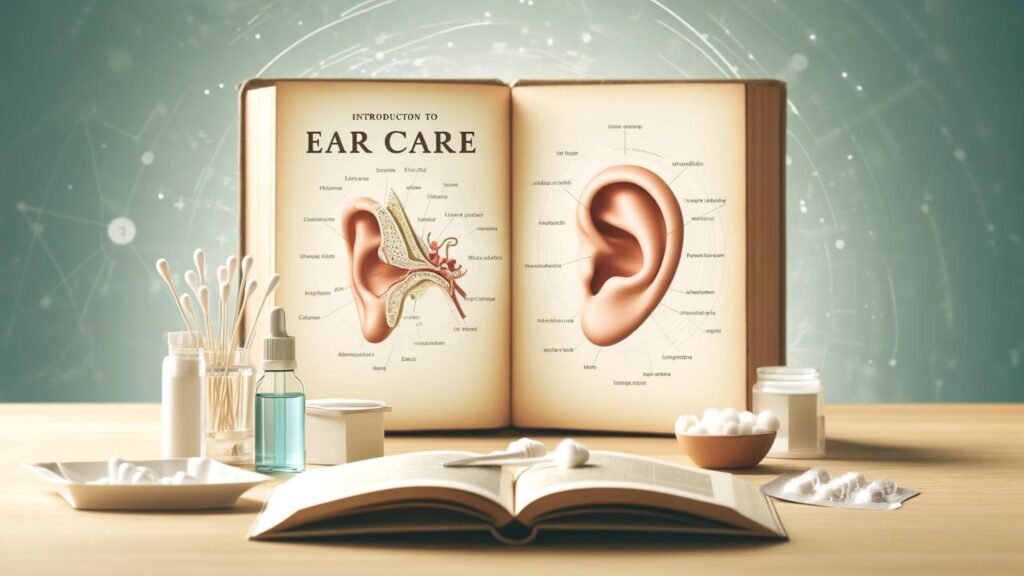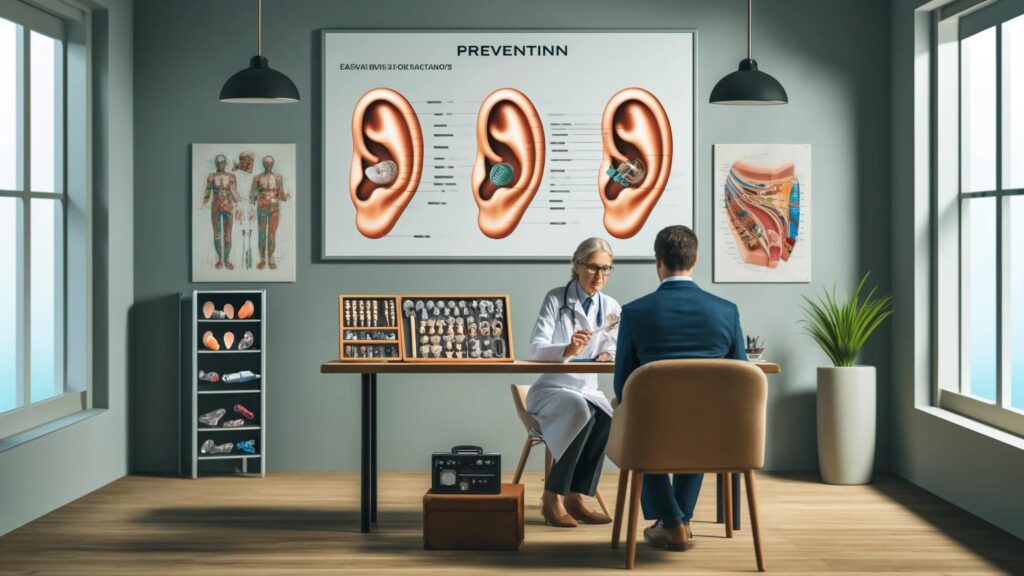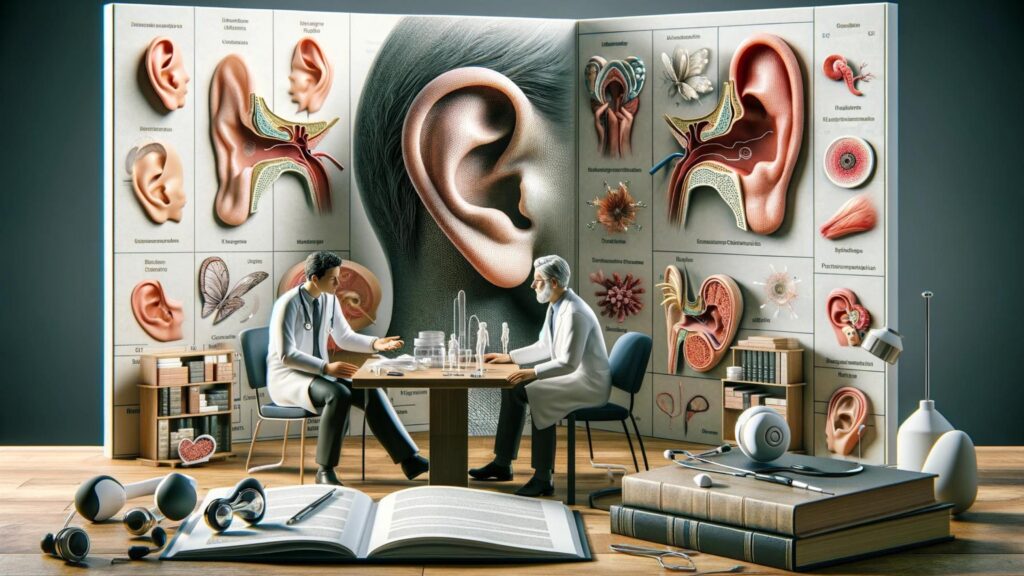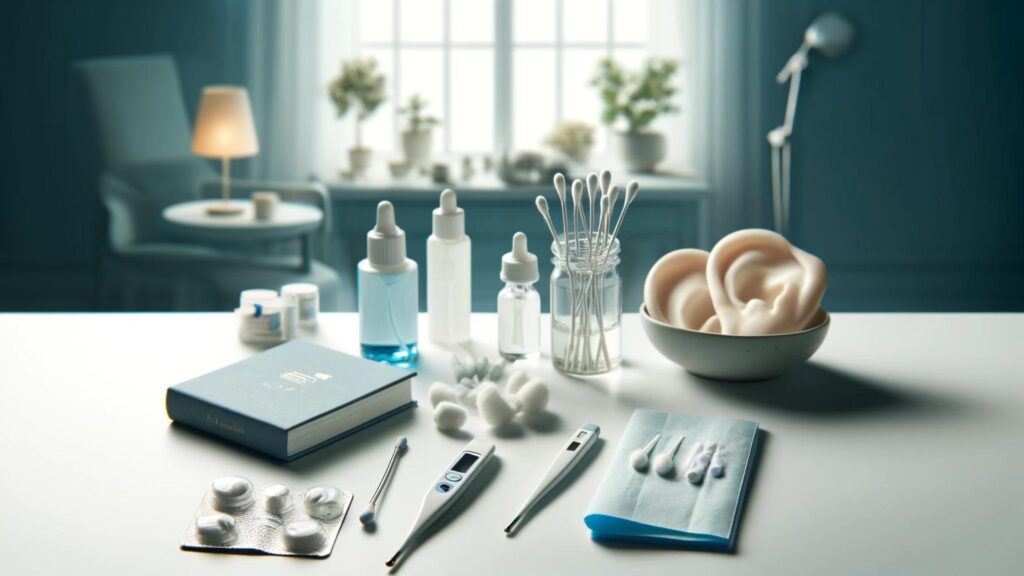Navigating the world of EarCare requires more than just passing interest; it requires a dedication to maintaining healthy hearing through informed practices and sound decisions. In this essential guide, we reveal a wealth of tips and deep insights that will enable you to effectively protect and improve your auditory health. This blog serves as a beacon for those seeking to maintain their hearing abilities, from understanding their ears’ intricate workings to embracing the most recent advancements in hearing technology. Learn how making simple changes to your daily routine can significantly improve your auditory experience. Join us as we highlight the importance of ear care in today’s noisy world.
- An Overview of Ear Care
- EarCare Essentials: What You Should Know for Optimal Hearing
- Exploring the Fundamentals of Ear Care: Anatomy and Function
- Ear Care Fundamentals: Understanding How We Hear
- The Importance of Ear Care: Key Advantages of Maintaining Ear Health
- EarCare Myths Debunked: Distinguishing Truth from Fiction in Hearing Health
- Ear Care and Lifestyle: How Daily Habits Affect Your Hearing
- Initial Ear Care Steps: Laying the Groundwork for Healthy Ears
- The Evolution of Earcare: Historical Perspectives on Hearing Health
- Global Approaches to Ear Care: Perspectives from Around the World
- Ear Care Awareness: Enhancing Understanding and Prevention
- Daily Ear Care Practices
- A step-by-step guide for implementing your daily ear care routine
- EarCare Hygiene Tips: Safe Ways to Clean Your Ears
- Ear Care Products to Trust: Reviews and Recommendations
- Advanced Ear Care Techniques: Beyond the Basics
- Ear Care for Different Environments: Adapting to Weather and Pollution
- Children's Ear Care: Developing Healthy Habits Early
- Ear Care for Seniors: Special Consideration for Aging Ears
- EarCare and Technology: Using Devices to Improve Hearing
- DIY Tips for Keeping Your Ears Healthy
- Ear Care and Professional Assistance: When to See a Specialist
- Preventative Ear Care
- Ear care and prevention: key strategies to avoid hearing loss
- Noise Exposure and Ear Care: Protecting from Sound Damage
- Ear Care at Work: Hearing Safety in Industrial Settings
- Recreational Ear Care: Keeping Your Ears Safe During Leisure Activities
- Tips for Keeping Your Ears Healthy While Traveling
- Ear Care for Musicians and Audio Professionals: Special Tips
- Ear Care and Sports: Ensure Ear Safety During Physical Activities
- Seasonal Ear Care: Adapting Your Routine to Climate Changes
- Ear Care for Swimmers: Addressing Common Water-Related Issues
- Holistic Ear Care: Integrating Natural Remedies with Modern Practices
- Ear Care for Specific Conditions
- Ear Care Strategies for Tinnitus Management
- Ear care solutions can help prevent and treat ear infections.
- Ear Care for Hearing Loss: Rehabilitation and Coping Strategies
- Ear care for vertigo and balance issues
- Managing Ear Pain: Tips for Relief
- Ear Care in Allergies and Sinus Conditions: Mitigating the Impact
- Ear Care After Surgery: Ensuring a Smooth Recovery
- Ear care and autoimmune disorders: special precautions
- Ear Care for Genetic Hearing Conditions: Tailored Approaches
- Ear Care for Temporary Hearing Issues: Managing Sudden Changes
- Technological Advancements in Ear Care
- Earcare Innovations: The Latest Advances in Hearing Technology
- Ear care and mobile apps: tools for monitoring and improving hearing
- EarCare Devices: Evaluating the Latest Hearing Aids and Sound Amplifiers
- Virtual Reality and EarCare: Immersive Experiences for Hearing Therapy
- Artificial Intelligence in EarCare: Predictive Analytics and Personalized Care
- EarCare Software: Programs for Hearing Health
- Biotechnology in Ear Care: The Future of Genetic Hearing Improvements
- EarCare Wearables: Tracking and Improving Your Hearing Daily
- Telehealth and ear care: remote consultations and diagnostics
- 3D printing and ear care: tailored solutions for hearing aids and implants
- Ear Care Across Demographics
- Ear Care for Infants and Toddlers: A Parent's Guide
- Youth and Teen Ear Care: Meeting Young People's Needs
- Ear Care for Adults: Maintaining Hearing Health in Your Prime Years
- Ear Care for Diverse Cultures: Understanding Different Hearing Health Practices
- Gender-Specific Ear Care: Meeting Unique Needs
- Ear Care for the Elderly: Concentrate on Age-Related Hearing Issues.
- Ear Care in Rural vs. Urban Settings: Environmental Impacts
- Global Ear Care: International Standards and Practices
- Community-Based Ear Care: Local Programs and Success Stories
- EarCare Advocacy: Promoting Better Hearing Worldwide
- EarCare: Comprehensive Tips for Healthy Hearing: A Step-by-Step Guide
- FAQs about Ear Care: Comprehensive Tips for Healthy Hearing
- Conclusion

An Overview of Ear Care
EarCare Essentials: What You Should Know for Optimal Hearing
Optimal hearing begins with a thorough understanding of EarCare’s essentials. It is critical to understand the environmental factors, lifestyle choices, and genetic predispositions that can affect your hearing health. With this knowledge, individuals can make informed decisions to protect their hearing abilities, ensuring a healthy auditory future.
Exploring the Fundamentals of Ear Care: Anatomy and Function
The human ear is a complex system with three major sections: the outer, middle, and inner ear. From the outer ear’s initial wave capture to the inner ear’s intricate nerve impulses, each component significantly contributes to our perception of sound. Understanding this anatomy is critical for detecting signs of dysfunction and managing ear health.
Ear Care Fundamentals: Understanding How We Hear
Hearing is a complex process that converts sound waves into electrical signals, which the brain interprets. The journey begins with sound waves entering the ear canal, causing vibrations in the eardrum. The middle ear’s ossicles amplify these vibrations before sending them to the cochlea, where they transform into neural signals. Understanding this process is critical when diagnosing and treating hearing impairments.
The Importance of Ear Care: Key Advantages of Maintaining Ear Health
Maintaining ear health is critical, not only for clear hearing but also for overall health. Effective ear care prevents infections, lowers the risk of hearing loss, and improves communication abilities. It also has a significant impact on balance and spatial orientation, making it an essential component of daily functioning and safety.
EarCare Myths Debunked: Distinguishing Truth from Fiction in Hearing Health
Many myths about proper ear care exist, such as the belief that cotton swabs are safe for ear cleaning or that hearing loss only affects the elderly. Debunking these myths is critical to promoting safe practices and avoiding harmful misconceptions that can cause long-term auditory damage.
Ear Care and Lifestyle: How Daily Habits Affect Your Hearing
Daily habits, such as the volume of your music and the earplugs you wear to concerts, have a significant impact on your hearing. Excessive noise exposure, poor dietary choices, and ignoring ear hygiene can all lead to impaired ear function. Adopting an ear-healthy lifestyle can help you maintain and even improve your hearing ability.
Initial Ear Care Steps: Laying the Groundwork for Healthy Ears
The path to effective ear care begins with simple steps like regular hearing tests and keeping the ears dry and clean. Establishing a routine early on can help prevent a variety of auditory problems later in life, laying the groundwork for good ear health.
The Evolution of Earcare: Historical Perspectives on Hearing Health
Ear care has evolved dramatically over the centuries, from ancient remedies to modern medical practices. Understanding the historical advancements in this field reveals how far we have come in diagnosing and treating ear-related ailments, emphasizing the importance of ongoing research and innovation.
Global Approaches to Ear Care: Perspectives from Around the World
Ear care practices and beliefs vary across cultures. These diverse approaches to ear health management offer a rich tapestry of options, ranging from herbal remedies in Eastern medicine to advanced surgical techniques in the West. Learning from global practices can lead to more effective and comprehensive EarCare strategies.
Ear Care Awareness: Enhancing Understanding and Prevention
Raising awareness about the importance of ear health and effective ear care practices is critical to prevention. Education can empower individuals to take proactive steps to prevent hearing loss and other ear-related conditions, fostering a society in which ear health is a top priority and widely understood.

Daily Ear Care Practices
A step-by-step guide for implementing your daily ear care routine
A structured daily EarCare routine is essential for maintaining good ear health. Begin by consulting a professional about your current ear health so that your routine can be tailored accordingly. Use gentle cleaning agents, and avoid pushing anything too deeply into your ear canals. End each day by wiping the outer ear with a soft, damp cloth to remove any remaining debris.
EarCare Hygiene Tips: Safe Ways to Clean Your Ears
Safe ear cleaning is essential for avoiding damage and infections. Instead of cotton swabs, use safer alternatives such as bulb syringes or over-the-counter ear cleaning drops that soften and remove excess wax without irritation. To avoid introducing bacteria, always clean your hands and tools before performing any ear hygiene practices.
Ear Care Products to Trust: Reviews and Recommendations
Navigating the maze of ear care products can be overwhelming. Look for products with few additives and a high safety rating, such as hypoallergenic cleaning solutions and clinically tested ear drops. Audiologists frequently recommend products like these, which can be relied on to provide safe ear care.
Advanced Ear Care Techniques: Beyond the Basics
For those looking to improve their ear care routine, advanced techniques like professional ear irrigation or prescription medications for recurring problems may be worth considering. Always consult with a healthcare provider before attempting more advanced care solutions to ensure that they are appropriate for your specific needs.
Ear Care for Different Environments: Adapting to Weather and Pollution
Extreme weather and pollution can exacerbate ear problems. Wear protective gear in cold climates to keep your ears warm and prevent infections, and in polluted cities, consider using filtered earplugs to keep harmful particles out.
Children’s Ear Care: Developing Healthy Habits Early
Young children who receive proper ear care are more likely to maintain good hearing throughout their lives. Teach them to avoid loud noises and keep their ears dry after a bath or swim. Regular check-ups with a pediatric audiologist can also help to identify and treat any problems early.
Ear Care for Seniors: Special Consideration for Aging Ears
As we age, our ears frequently require more attention. Seniors should have their hearing tested on a regular basis and may require specialized care, such as more frequent professional cleanings or custom-made hearing aids. It is also critical to manage other health issues that may affect hearing, such as diabetes or high blood pressure.
EarCare and Technology: Using Devices to Improve Hearing
Modern technology provides a variety of devices to improve ear health, including sophisticated hearing aids and smartphone apps that monitor sound exposure. Using these tools can significantly improve the quality of life, particularly for people with hearing impairments.
DIY Tips for Keeping Your Ears Healthy
Simple home remedies and DIY tips can help maintain ear health. A warm compress, for example, can provide pain relief, while olive oil drops can help soften wax buildup. Always consult a health professional before attempting new home remedies, especially if you have ongoing ear conditions.
Ear Care and Professional Assistance: When to See a Specialist
Knowing when to seek professional help is critical in EarCare. Symptoms such as persistent pain, hearing loss, or sudden discharge should prompt an appointment with an ENT specialist or audiologist. These professionals can provide more comprehensive care and treatment options that extend beyond routine maintenance.

Preventative Ear Care
Ear care and prevention: key strategies to avoid hearing loss
Understanding the risk factors and implementing effective strategies are key to preventing hearing loss. Regular hearing tests, avoiding prolonged exposure to loud noises, and wearing appropriate ear protection are all important practices that can significantly reduce the risk of hearing loss.
Noise Exposure and Ear Care: Protecting from Sound Damage
Excessive noise is one of the leading causes of hearing damage. You can protect your hearing by using noise-cancelling headphones, maintaining a safe distance from loud speakers, and limiting your time in noisy environments.
Ear Care at Work: Hearing Safety in Industrial Settings
Strict hearing protection protocols are required in industrial settings where noise levels can consistently exceed safe thresholds. Employers should provide proper ear protection, such as earmuffs or plugs, and require regular hearing tests for their employees.
Recreational Ear Care: Keeping Your Ears Safe During Leisure Activities
Leisure activities, such as attending concerts, hunting, or participating in motorsports, can be dangerous to your hearing. Using custom-fitted earplugs designed for specific activities can significantly reduce the risk of hearing damage while still allowing participants to enjoy the event.
Tips for Keeping Your Ears Healthy While Traveling
Changes in air pressure during flights can stress the ears, potentially causing discomfort and hearing problems. Chewing gum, yawning frequently, and wearing pressure-regulating earplugs can help manage these changes and keep your ears comfortable and healthy while traveling.
Ear Care for Musicians and Audio Professionals: Special Tips
Due to their constant exposure to loud sounds, musicians and audio professionals are more likely to develop hearing loss. Using in-ear monitors that can control volume and filter out background noise is critical for protecting your hearing while performing or mixing.
Ear Care and Sports: Ensure Ear Safety During Physical Activities
Sports, particularly those involving water or high altitude, can have an impact on ear health. Wearing protective gear, such as cycling helmets with built-in ear protection or swimming earplugs, can help prevent injuries and infections.
Seasonal Ear Care: Adapting Your Routine to Climate Changes
Seasonal changes can present various challenges to ear health, such as increased humidity in the summer, resulting in swimmer’s ear, or dry, cold air in the winter, causing ear canal irritation. Adapting your EarCare routine to these changes is essential for avoiding seasonal ear problems.
Ear Care for Swimmers: Addressing Common Water-Related Issues
Regular exposure to water can cause outer ear infections, also known as swimmer’s ear. Drying your ears thoroughly after swimming, wearing custom water-blocking earplugs, and using an alcohol-based ear drop are all ways to prevent these infections.
Holistic Ear Care: Integrating Natural Remedies with Modern Practices
Integrating holistic approaches like acupuncture, herbal treatments, and yoga into your Ear Care routine can supplement traditional medical practices. These methods can improve blood circulation to the ears while also alleviating symptoms of tinnitus and other ear disorders, providing a comprehensive approach to ear health.

Ear Care for Specific Conditions
Ear Care Strategies for Tinnitus Management
Tinnitus can be managed through a combination of lifestyle changes, therapeutic techniques, and, in some cases, medication. Sound therapy, cognitive-behavioral therapy (CBT), and relaxation exercises can all help to reduce the perception of ringing or noise in the ears, thereby improving quality of life.
Ear care solutions can help prevent and treat ear infections.
Ear infections can be avoided by practicing good ear hygiene, drying ears after exposure to water, and avoiding the insertion of objects into the ear canal. Doctors frequently prescribe antibiotics or antifungal treatments, as well as pain relievers, to help patients recover. Timely treatment can help to avoid complications and speed up recovery.
Ear Care for Hearing Loss: Rehabilitation and Coping Strategies
Hearing aids, cochlear implants, and other assistive devices may be used in the rehabilitation of hearing loss. Lip reading and sign language training are both effective coping strategies. Regular consultations with an audiologist are essential for ongoing care and adjustments.
Ear care for vertigo and balance issues
Addressing vertigo and balance issues frequently entails vestibular rehabilitation therapy, which assists the brain in adapting to changes in the inner ear. Dietary changes and targeted exercises can also help with symptoms. It is critical to identify the underlying cause in order to tailor the appropriate treatment.
Managing Ear Pain: Tips for Relief
Ear pain can be relieved with over-the-counter pain relievers, warm compresses, or prescribed ear drops. It is critical to keep the ear clean and free of blockages and infections. If ear pain persists, you should seek medical attention to address any underlying issues.
Ear Care in Allergies and Sinus Conditions: Mitigating the Impact
Managing allergies and sinus conditions can help alleviate associated ear issues, such as eustachian tube dysfunction. Antihistamines, nasal sprays, and allergy shots can help relieve symptoms, and avoiding allergens is essential for long-term management.
Ear Care After Surgery: Ensuring a Smooth Recovery
Post-surgical care for the ear typically includes keeping the surgical site clean, avoiding water and strenuous activities, and adhering to all post-operative instructions from the healthcare provider. Regular follow-up appointments are required to monitor healing and avoid infections.
Ear care and autoimmune disorders: special precautions
People with autoimmune disorders may have more frequent ear problems, such as sudden hearing loss or vestibular issues. Immunomodulating treatments and regular monitoring can help manage these symptoms and lessen their impact on ear health.
Ear Care for Genetic Hearing Conditions: Tailored Approaches
Genetic hearing conditions necessitate specialized care strategies, which frequently include genetic counseling, regular auditory testing, and personalized hearing solutions. Regardless of genetic predispositions, early intervention can significantly improve outcomes and allow people to live more fulfilling lives.
Ear Care for Temporary Hearing Issues: Managing Sudden Changes
Loud noise exposure, earwax buildup, and infections can all cause temporary hearing loss. Immediate measures include resting the ears, limiting exposure to loud noises, and seeking medical attention to determine the cause and the best treatment.
- An Overview of Ear Care
- EarCare Essentials: What You Should Know for Optimal Hearing
- Exploring the Fundamentals of Ear Care: Anatomy and Function
- Ear Care Fundamentals: Understanding How We Hear
- The Importance of Ear Care: Key Advantages of Maintaining Ear Health
- EarCare Myths Debunked: Distinguishing Truth from Fiction in Hearing Health
- Ear Care and Lifestyle: How Daily Habits Affect Your Hearing
- Initial Ear Care Steps: Laying the Groundwork for Healthy Ears
- The Evolution of Earcare: Historical Perspectives on Hearing Health
- Global Approaches to Ear Care: Perspectives from Around the World
- Ear Care Awareness: Enhancing Understanding and Prevention
- Daily Ear Care Practices
- A step-by-step guide for implementing your daily ear care routine
- EarCare Hygiene Tips: Safe Ways to Clean Your Ears
- Ear Care Products to Trust: Reviews and Recommendations
- Advanced Ear Care Techniques: Beyond the Basics
- Ear Care for Different Environments: Adapting to Weather and Pollution
- Children's Ear Care: Developing Healthy Habits Early
- Ear Care for Seniors: Special Consideration for Aging Ears
- EarCare and Technology: Using Devices to Improve Hearing
- DIY Tips for Keeping Your Ears Healthy
- Ear Care and Professional Assistance: When to See a Specialist
- Preventative Ear Care
- Ear care and prevention: key strategies to avoid hearing loss
- Noise Exposure and Ear Care: Protecting from Sound Damage
- Ear Care at Work: Hearing Safety in Industrial Settings
- Recreational Ear Care: Keeping Your Ears Safe During Leisure Activities
- Tips for Keeping Your Ears Healthy While Traveling
- Ear Care for Musicians and Audio Professionals: Special Tips
- Ear Care and Sports: Ensure Ear Safety During Physical Activities
- Seasonal Ear Care: Adapting Your Routine to Climate Changes
- Ear Care for Swimmers: Addressing Common Water-Related Issues
- Holistic Ear Care: Integrating Natural Remedies with Modern Practices
- Ear Care for Specific Conditions
- Ear Care Strategies for Tinnitus Management
- Ear care solutions can help prevent and treat ear infections.
- Ear Care for Hearing Loss: Rehabilitation and Coping Strategies
- Ear care for vertigo and balance issues
- Managing Ear Pain: Tips for Relief
- Ear Care in Allergies and Sinus Conditions: Mitigating the Impact
- Ear Care After Surgery: Ensuring a Smooth Recovery
- Ear care and autoimmune disorders: special precautions
- Ear Care for Genetic Hearing Conditions: Tailored Approaches
- Ear Care for Temporary Hearing Issues: Managing Sudden Changes
- Technological Advancements in Ear Care
- Earcare Innovations: The Latest Advances in Hearing Technology
- Ear care and mobile apps: tools for monitoring and improving hearing
- EarCare Devices: Evaluating the Latest Hearing Aids and Sound Amplifiers
- Virtual Reality and EarCare: Immersive Experiences for Hearing Therapy
- Artificial Intelligence in EarCare: Predictive Analytics and Personalized Care
- EarCare Software: Programs for Hearing Health
- Biotechnology in Ear Care: The Future of Genetic Hearing Improvements
- EarCare Wearables: Tracking and Improving Your Hearing Daily
- Telehealth and ear care: remote consultations and diagnostics
- 3D printing and ear care: tailored solutions for hearing aids and implants
- Ear Care Across Demographics
- Ear Care for Infants and Toddlers: A Parent's Guide
- Youth and Teen Ear Care: Meeting Young People's Needs
- Ear Care for Adults: Maintaining Hearing Health in Your Prime Years
- Ear Care for Diverse Cultures: Understanding Different Hearing Health Practices
- Gender-Specific Ear Care: Meeting Unique Needs
- Ear Care for the Elderly: Concentrate on Age-Related Hearing Issues.
- Ear Care in Rural vs. Urban Settings: Environmental Impacts
- Global Ear Care: International Standards and Practices
- Community-Based Ear Care: Local Programs and Success Stories
- EarCare Advocacy: Promoting Better Hearing Worldwide
- EarCare: Comprehensive Tips for Healthy Hearing: A Step-by-Step Guide
- FAQs about Ear Care: Comprehensive Tips for Healthy Hearing
- Conclusion

Technological Advancements in Ear Care
Earcare Innovations: The Latest Advances in Hearing Technology
Hearing technology is rapidly advancing, with devices becoming smaller, more powerful, and more discreet than ever before. These innovations not only improve the user’s ability to hear, but they also integrate seamlessly into daily life, increasing connectivity across multiple digital platforms.
Ear care and mobile apps: tools for monitoring and improving hearing
Mobile apps now play an important role in hearing health management, providing features such as hearing tests, sound level meters, and personalized hearing enhancement settings. These tools enable people to actively monitor their hearing health and make real-time adjustments.
EarCare Devices: Evaluating the Latest Hearing Aids and Sound Amplifiers
The most recent hearing aids and sound amplifiers include advanced features like directional microphones, wireless streaming, and tinnitus masking. This section discusses these devices and how they can meet a variety of hearing needs.
Virtual Reality and EarCare: Immersive Experiences for Hearing Therapy
Immersion environments utilizing virtual reality (VR) technology aid in hearing therapy and rehabilitation. These VR experiences help users with hearing loss improve their auditory skills in a controlled, engaging environment.
Artificial Intelligence in EarCare: Predictive Analytics and Personalized Care
EarCare uses artificial intelligence (AI) and predictive analytics to anticipate hearing health trends and personalize care plans. To improve hearing aid performance, AI algorithms analyze data from hearing tests and daily usage patterns.
EarCare Software: Programs for Hearing Health
Several software programs are now available that promote hearing health by offering auditory training, speech enhancement, and noise reduction capabilities. These programs aim to improve the auditory experience, especially in demanding listening settings.
Biotechnology in Ear Care: The Future of Genetic Hearing Improvements
Biotechnology is paving the way for genetic improvements in hearing health, with research focusing on gene therapy as a potential cure for certain types of hereditary hearing loss. This promising field holds the key to future advances in ear care.
EarCare Wearables: Tracking and Improving Your Hearing Daily
EarCare’s wearable technology includes devices that monitor hearing health metrics and improve auditory performance. These wearables keep users connected to their surroundings by intelligently adapting to ambient soundscapes.
Telehealth and ear care: remote consultations and diagnostics
Telehealth has transformed EarCare by enabling remote consultations and diagnostics, allowing patients to receive care in the comfort of their own homes. This is especially beneficial to people living in remote or underserved areas.
3D printing and ear care: tailored solutions for hearing aids and implants
3D printing technology is transforming EarCare by allowing the creation of custom-fit hearing aids and implants. This technology enables more precise and personalized solutions for hearing loss, improving both comfort and effectiveness.

Ear Care Across Demographics
Ear Care for Infants and Toddlers: A Parent’s Guide
Early ear care is critical for babies and toddlers, who are more prone to ear infections and hearing problems. Parents should learn how to gently clean their children’s ears and recognize the early signs of hearing problems. We recommend regular pediatric hearing tests to ensure proper auditory development.
Youth and Teen Ear Care: Meeting Young People’s Needs
Activities like concerts and sporting events expose children to increased noise as they grow older. Educating young people about the dangers of loud noise and the importance of wearing ear protection can help prevent premature hearing loss.
Ear Care for Adults: Maintaining Hearing Health in Your Prime Years
Adults often develop hearing loss during their prime working years. Regular hearing checkups and limiting exposure to loud noises are important strategies for keeping your hearing healthy. Stress management and maintaining a healthy lifestyle are also important factors.
Ear Care for Diverse Cultures: Understanding Different Hearing Health Practices
Cultural practices for ear care can vary greatly. Understanding these distinctions is critical for healthcare providers to provide respectful and effective treatment, as well as for individuals to appreciate the diversity of ear care practices around the world.
Gender-Specific Ear Care: Meeting Unique Needs
Men and women may face different risks and types of hearing loss due to anatomical differences or lifestyle choices. Tailoring EarCare to these specific needs can improve outcomes and provide more personalized care.
Ear Care for the Elderly: Concentrate on Age-Related Hearing Issues.
The elderly frequently suffer from age-related hearing loss, also known as presbycusis. The use of assistive listening devices, regular auditory check-ups, and community support can all help seniors improve their quality of life and communicate more effectively.
Ear Care in Rural vs. Urban Settings: Environmental Impacts
Environmental factors in rural and urban areas can have varying effects on hearing. Rural areas may expose individuals to agricultural noise, whereas urban environments frequently have constant background noise. It is critical that EarCare practices adapt to these settings.
Global Ear Care: International Standards and Practices
International EarCare standards ensure that individuals, regardless of location, have access to high-quality hearing care. Understanding and implementing these standards can help to unify and improve care practices across borders.
Community-Based Ear Care: Local Programs and Success Stories
Local EarCare programs that prioritize community engagement and education have the potential to significantly improve a population’s hearing health. Highlighting success stories from these programs can motivate others to take similar actions.
EarCare Advocacy: Promoting Better Hearing Worldwide
Advocacy for better hearing health is critical for raising awareness and influencing policy. Communities and governments can collaborate to reduce the prevalence of hearing loss and improve quality of life by raising awareness about the importance of hearing health and advocating for access to care.
- An Overview of Ear Care
- EarCare Essentials: What You Should Know for Optimal Hearing
- Exploring the Fundamentals of Ear Care: Anatomy and Function
- Ear Care Fundamentals: Understanding How We Hear
- The Importance of Ear Care: Key Advantages of Maintaining Ear Health
- EarCare Myths Debunked: Distinguishing Truth from Fiction in Hearing Health
- Ear Care and Lifestyle: How Daily Habits Affect Your Hearing
- Initial Ear Care Steps: Laying the Groundwork for Healthy Ears
- The Evolution of Earcare: Historical Perspectives on Hearing Health
- Global Approaches to Ear Care: Perspectives from Around the World
- Ear Care Awareness: Enhancing Understanding and Prevention
- Daily Ear Care Practices
- A step-by-step guide for implementing your daily ear care routine
- EarCare Hygiene Tips: Safe Ways to Clean Your Ears
- Ear Care Products to Trust: Reviews and Recommendations
- Advanced Ear Care Techniques: Beyond the Basics
- Ear Care for Different Environments: Adapting to Weather and Pollution
- Children's Ear Care: Developing Healthy Habits Early
- Ear Care for Seniors: Special Consideration for Aging Ears
- EarCare and Technology: Using Devices to Improve Hearing
- DIY Tips for Keeping Your Ears Healthy
- Ear Care and Professional Assistance: When to See a Specialist
- Preventative Ear Care
- Ear care and prevention: key strategies to avoid hearing loss
- Noise Exposure and Ear Care: Protecting from Sound Damage
- Ear Care at Work: Hearing Safety in Industrial Settings
- Recreational Ear Care: Keeping Your Ears Safe During Leisure Activities
- Tips for Keeping Your Ears Healthy While Traveling
- Ear Care for Musicians and Audio Professionals: Special Tips
- Ear Care and Sports: Ensure Ear Safety During Physical Activities
- Seasonal Ear Care: Adapting Your Routine to Climate Changes
- Ear Care for Swimmers: Addressing Common Water-Related Issues
- Holistic Ear Care: Integrating Natural Remedies with Modern Practices
- Ear Care for Specific Conditions
- Ear Care Strategies for Tinnitus Management
- Ear care solutions can help prevent and treat ear infections.
- Ear Care for Hearing Loss: Rehabilitation and Coping Strategies
- Ear care for vertigo and balance issues
- Managing Ear Pain: Tips for Relief
- Ear Care in Allergies and Sinus Conditions: Mitigating the Impact
- Ear Care After Surgery: Ensuring a Smooth Recovery
- Ear care and autoimmune disorders: special precautions
- Ear Care for Genetic Hearing Conditions: Tailored Approaches
- Ear Care for Temporary Hearing Issues: Managing Sudden Changes
- Technological Advancements in Ear Care
- Earcare Innovations: The Latest Advances in Hearing Technology
- Ear care and mobile apps: tools for monitoring and improving hearing
- EarCare Devices: Evaluating the Latest Hearing Aids and Sound Amplifiers
- Virtual Reality and EarCare: Immersive Experiences for Hearing Therapy
- Artificial Intelligence in EarCare: Predictive Analytics and Personalized Care
- EarCare Software: Programs for Hearing Health
- Biotechnology in Ear Care: The Future of Genetic Hearing Improvements
- EarCare Wearables: Tracking and Improving Your Hearing Daily
- Telehealth and ear care: remote consultations and diagnostics
- 3D printing and ear care: tailored solutions for hearing aids and implants
- Ear Care Across Demographics
- Ear Care for Infants and Toddlers: A Parent's Guide
- Youth and Teen Ear Care: Meeting Young People's Needs
- Ear Care for Adults: Maintaining Hearing Health in Your Prime Years
- Ear Care for Diverse Cultures: Understanding Different Hearing Health Practices
- Gender-Specific Ear Care: Meeting Unique Needs
- Ear Care for the Elderly: Concentrate on Age-Related Hearing Issues.
- Ear Care in Rural vs. Urban Settings: Environmental Impacts
- Global Ear Care: International Standards and Practices
- Community-Based Ear Care: Local Programs and Success Stories
- EarCare Advocacy: Promoting Better Hearing Worldwide
- EarCare: Comprehensive Tips for Healthy Hearing: A Step-by-Step Guide
- FAQs about Ear Care: Comprehensive Tips for Healthy Hearing
- Conclusion
EarCare: Comprehensive Tips for Healthy Hearing: A Step-by-Step Guide
Healthy hearing is essential for a good quality of life. This guide outlines comprehensive steps for maintaining and improving ear health, ensuring clarity and longevity in your auditory experiences.
Step One: Understand Your Ears
Learn basic anatomy. Familiarize yourself with the outer, middle, and inner ears, as well as their functions in hearing.
Recognizing Early Signs of Issues: Be aware of symptoms such as persistent itching, pain, or hearing loss, as these could indicate underlying issues.
Step 2: Daily Cleaning and Maintenance
Clean Ears Safely: Using a damp cloth, clean the outer ear. Avoid inserting cotton swabs into the ear canals.
Check for Wax Buildup: If you have a blockage, try using over-the-counter ear drops designed to soften wax. If the problem persists, contact a professional.
Step 3: Protect your ears from noise.
Identify Dangerous Situations: Environments in which you must shout to be heard are likely too loud and may harm your hearing.
Use Protection: To protect your hearing in noisy environments, such as concerts or construction sites, wear earplugs or noise-cancelling headphones.
Step 4: Optimize your environment.
Reduce background noise at home and work with carpets, curtains, and acoustic panels.
Keep Water Out: Use earplugs when swimming to prevent infections, and make sure to thoroughly dry your ears after exposure to moisture.
Step 5: Monitor Your Hearing Health
Schedule regular checkups. Annually, see an audiologist to assess your hearing abilities and overall health.
Use Apps for Monitoring: Utilize smartphone apps to track your hearing health and alert you to potential issues.
Step 6: Accept technological aids.
Consider Hearing Aids: If you have hearing loss, look into hearing aids. Modern devices are discreet and can be tailored to your specific needs.
Stay up-to-date with innovations. Keep an eye out for new technologies that can improve hearing and overall ear health.
Step 7: Lifestyle Adjustments
Diet and Exercise: A healthy diet high in omega-3 fatty acids and antioxidants can help preserve hearing. Regular exercise promotes blood flow, which is beneficial to ear health.
Manage Stress: Excessive stress can harm your hearing. Relaxation techniques such as yoga or meditation are recommended.
Step 8: Educate yourself and others.
Learn about Ear Health: Stay up-to-date on the latest research and developments in ear care.
Spread the word: Share what you’ve learned with family and friends to help them keep their ears healthy.
Adopting these comprehensive ear care tips will not only help you maintain your hearing health but will also benefit your overall well-being. Maintaining your ears healthy for years to come requires regular care and an understanding of the dos and don’ts.
FAQs about Ear Care: Comprehensive Tips for Healthy Hearing
1. How frequently should I clean my ears?
Clean the outer ear with a damp cloth on a regular basis, but avoid cleaning the ear canal excessively, as this can cause irritation or infection.
2. What is the safest method for removing earwax?
The safest method is to use over-the-counter ear drops that soften the wax. If the wax buildup is severe, it is best to have it removed by a medical professional.
3. Do earphones cause hearing loss?
Yes, prolonged exposure to loud music via earphones can damage your hearing. We recommend keeping the volume at or below 60% of its maximum and using it for no more than an hour at a time.
4. What are the indications of hearing loss?
Signs include difficulty understanding people, having to turn up the volume on the television, and frequently asking others to repeat themselves.
5. How do I protect my ears from loud noises?
In loud environments, such as concerts, festivals, or workplaces, wear earplugs or earmuffs.
6. Are there any natural treatments for ear infections?
Warm compresses can alleviate ear infection-related pain. However, if the symptoms persist, seek medical attention.
7. What do I do if water becomes trapped in my ears?
Tilting your head to the side and gently tugging on your earlobe may help. If water remains, over-the-counter ear drops can help dry out the ear.
8. How does diet affect hearing health?
A diet high in omega-3 fatty acids, vitamins, and minerals can improve ear health and possibly lower the risk of hearing loss.
9. What are the best ways to use hearing aids?
Keep them clean, replace the batteries on a regular basis, and have them checked and adjusted by a professional to ensure peak performance.
10. What is tinnitus, and what are the treatment options?
Tinnitus is the perception of sound or ringing in the ears. Managing stress, limiting caffeine intake, and using sound therapy can all help to alleviate symptoms.
11. Do allergies affect my ears?
Yes, allergies can cause fluid buildup in the middle ear, potentially causing pain or a feeling of fullness.
12. What are the most common causes of vertigo?
Inner ear disorders, including benign paroxysmal positional vertigo (BPPV), are common causes. Head movements or medication may be included in treatment.
13. How does smoking affect your hearing?
Smoking can damage blood vessels, including those in the ears, potentially causing hearing loss.
14. At what age should hearing tests start?
If there are signs of hearing problems, newborns and children should undergo hearing tests. Adults should have their hearing tested on a regular basis or after experiencing hearing changes.
15. How should I select the appropriate ear protection for noisy activities?
Select ear protection that has the right noise reduction rating (NRR) for the noise level you will encounter.
16. How can I prevent swimmer’s ear?
After swimming, thoroughly dry your ears; wear swimming caps or earplugs; and avoid swimming in dirty water.
17. Is ear candling a safe method of cleaning ears?
No, ear candling is unsafe and can result in serious injuries. It’s best to use safer ear cleaning methods.
18. Can hearing loss be reversed?
Most types of sensorineural hearing loss are irreversible, but hearing aids and cochlear implants can help manage the condition.
19. What are the early signs of a child’s ear infection?
Ear tugging, fussiness, ear fluid draining, fever, and difficulty sleeping are some of the symptoms.
20. How often should you replace your hearing aids?
Depending on wear and tear and shifting hearing needs, you should replace your hearing aids every 3 to 5 years.
Conclusion
Ear Care: Comprehensive Tips for Healthy Hearing emphasizes the importance of proactive auditory maintenance for our overall health and daily communication. Adhering to this guide ensures not only the preservation of hearing, but also improves life quality by allowing for clear and vibrant connections with our surroundings. In a noisy world that constantly tests our ears, ignoring ear health is no longer an option. Learn more about ear health in our detailed blog posts—stay informed and protect your hearing today!

